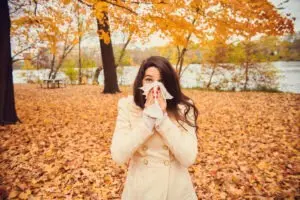We often think of Spring as the single worst allergy season, but would it be shocking if we said this is not always true? The Fall season offers a lot of positives, but it also offers its own fair share of allergens, which may make it a particularly difficult time of year for some.
Each of these seasons is prime time for certain allergens, but the question is, which ones are affecting you?
Fall Allergies
Ragweed
Ragweed is a late-summer weed that does not release its pollen supply until near the end of August. Areas with a warmer climate may even see ragweed pollen hang around all the way through December and into the beginning of January.
Mold
Warm temperatures will also affect the growth of mold spores, which are a very common culprit of many fall allergies. Humid summer months, along with rotting, damp leaves that cover the ground outside, are both huge contributors to mold growth.
Sadly, there is little you can do to control the weather or stop the leaves from falling, but controlling your home’s humidity level with a dehumidifier is one very helpful step in the right direction.
Dust Mites
Just like mold, dust mites are fond of warm, damp environments. These mites will eventually die off once the temperatures drop low enough, but they can cause a lot of sniffling and sneezing in the meantime.
Though you will never be able to get rid of all the dust in your home, you can utilize products like dust mite covers on your bed and pillows, as both of these will help to limit your dust mite exposure.
Spring Allergies
Tree Pollen
A very large majority of Spring allergies come from newly blooming trees, which are relentlessly releasing pollen into the air around you. These pollen levels will eventually stabilize to the point where you can find some relief, but even in the summer months there will be different plant species coming into bloom to raise the pollen count once again.
Find a Solution
There is a wide variety of treatment options available to those that suffer from severe Spring or Fall allergies. Some may find that simple lifestyle changes can provide an overwhelming amount of relief, while others may require prescribed medications.
Reviewed by the board-certified ENTs doctors at Coastal Ear, Nose & Throat
Still have questions? Ask one of our ENT doctors!


